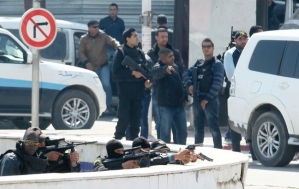
A museum in Tunisia's capital was besieged by shooters on Wednesday as they tried to attack the country's national assembly. The melee left 20 people dead, 18 of them foreign tourists.
According to Tamer El-Ghobashy and Radhouane Addala of the Wall Street Journal, Tunisian lawmakers were debating on whether or not to pass an antiterrorism bill when the shooting began. The attack also cast a shadow on the country that was the birthplace of the Arab Spring, which ousted autocrat Zine El Abidine Ben Ali in January 2011.
"This is a double strike against both our democracy and our economy," Abdelfatah Mourou, vice speaker of Parliament, said. "These people knew what they were doing."
The Wall Street Journal reported that the latest attack sparked fears in Tunisia that any democratic overhauls would be reversed. No one has yet claimed responsibility for the attack.
According to a report from the Associated Press, the shooters wore military-style uniforms and wielded assault rifles; they came out of a vehicle and began gunning down tourists at the National Bardo Museum. The gunmen also tried to take hostages, but security forces managed to kill them.
"I want the people of Tunisia to understand firstly and lastly that we are in a war with terror, and these savage minority groups will not frighten us," newly elected Tunisian president Beji Caid Essebsi said. "The fight against them will continue until they are exterminated."
Tunisian Prime Minister Habib Essid told AP that at least 44 people were wounded in the attack, including tourists from Italy, France, Japan, South Africa, Poland, Belgium and Russia. As for the people who died, five were from Japan, four from Italy, two from Colombia, two from Spain, and one each from Australia, Poland, and France; two Tunisian nationals were also killed by militants.
"After they entered the museum, I saw their faces," Josep Lluis Cusido said. "They were about 10 meters away from me, shooting anything that moved."
Cusido, who was at the museum with his wife, added that he "managed to hide behind a pillar" and avoid getting shot at by the gunmen.
According to the Wall Street Journal, the Bardo National Museum is best known internationally for its vast collection of Roman mosaics, including one that dated from the 3rd century A.D. It also contained a collection of Greek artifacts and a collection of Islamic manuscripts.
"Tunisia has been more stable than other countries in the region, but has struggled with violence by Islamic extremists who have sworn allegiance to both al-Qaida and the Islamic State group," AP wrote.
According to AP, the United States, France, the United Arab Emirates and the United Nations condemned the violent tragedy. Secretary of State John Kerry said that Washington "condemns in the strongest possible terms today's terrorist attack" and credited Tunisia's "rapid response" in resolving the crisis and maintaining calm.







